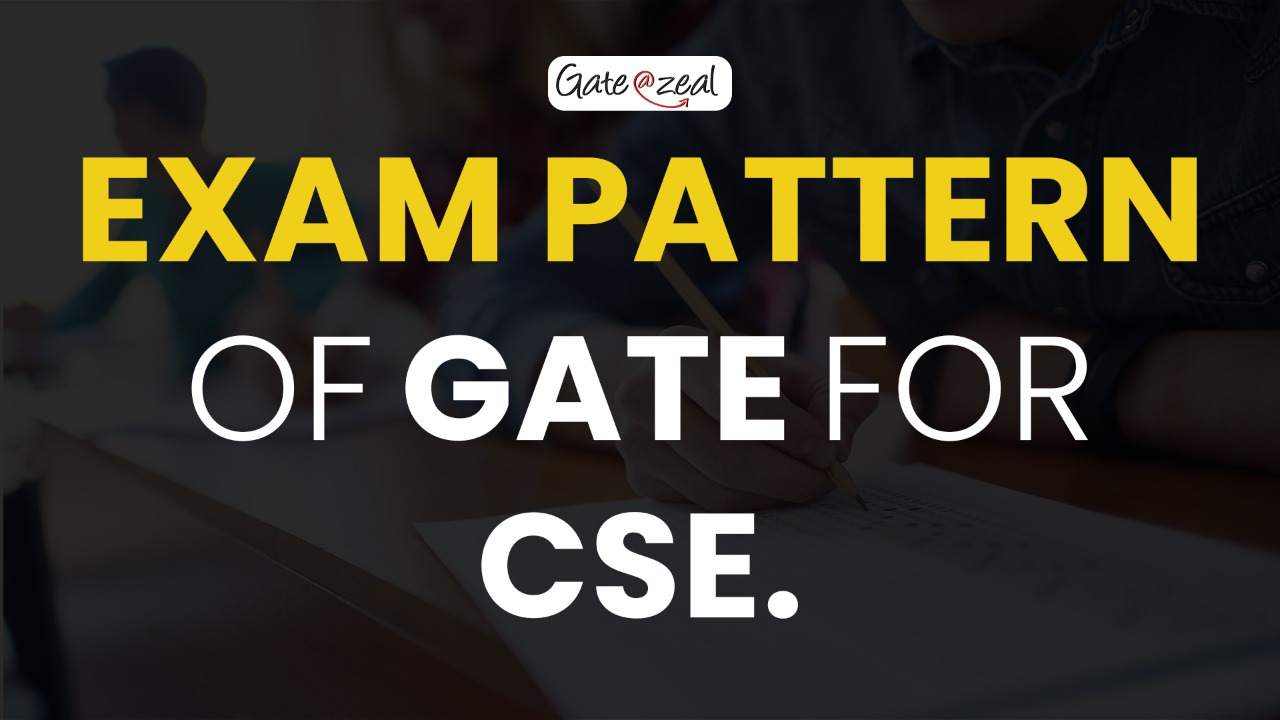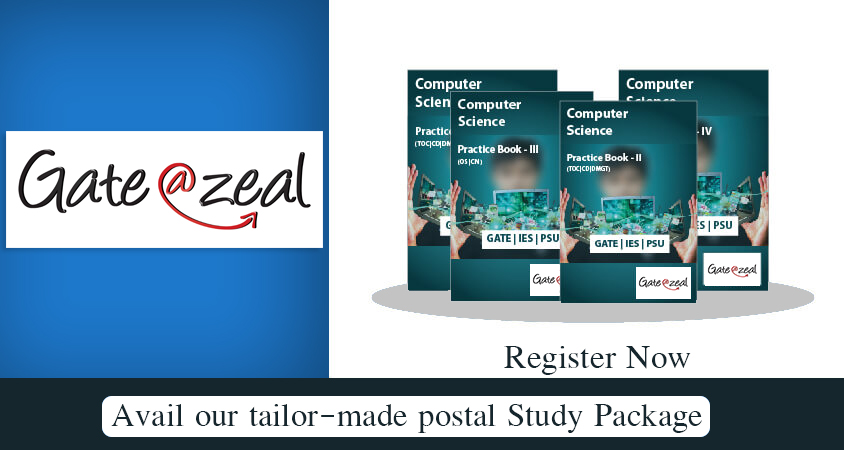
What is the exam pattern of the GATE for CSE?
- Gateatzeal
- 01-04-2021
The Great "Graduate Aptitude Test in Engineering"
(GATE) comes first in the list of the toughest exams in the country, with lakhs
of students sitting in the exam hall for this every year. Although this is a
challenging and competitive exam.
Climbing Everest appears to be simple if you are determined. And
if you've decided to go for the GATE exam, you've come to the right place; we'll
tell you everything you need to know about the GATE CS exam pattern. And we all
know that before attempting any exam, we should learn all there is to know
about it, so let us tell you everything about the exam pattern for the GATE CSE
exam.
Basic Information about GATE examination –
The Graduate Aptitude Test in Engineering has been held since
1984 when it was established by IISC Bangalore to provide admission to Masters
and Doctoral programs at IISC and IITs.
And for now, it is being conducted on behalf of the National
Coordination Board, Ministry of Education, Department of Higher Education, and
the Government of India. The GATE examination is administered jointly by the
Indian Institute of Science Bangalore and seven IITs: Roorkee, Bombay,
Guwahati, Kharagpur, Kanpur, Delhi, and Madras.
The GATE exam is an internet compulsory test that is held in
eight zones of India. In recent periods, international applicants from
Bangladesh, Nepal, Sri Lanka, Ethiopia, and the United Arab Emirates have been
allowed to take the GATE exam. The primary goal of this exam is to gain
admission and financial aid to Postgraduate Programs like Masters and Doctoral.
Latest news about GATE CSE exam –
According to a rotation rule adopted by all IITs, IIT Kharagpur
is planned to host the GATE 2022 examination. According to IIT Kharagpur's
notification, the online application form will be available in the first week
of September 2021, with the deadline for submission in the fourth week of
September 2021.
The application error window will open in the second week of
September 2021, and the deadline for late applications with late fees will be
in the first week of October 2021.
The admit card will be issued in the first week of January 2022,
and the exam will be held between the first and second weeks of February 2022.
After that, the response keys will be released in the third week of February
2022, the result will be revealed in the third week of March 2022, and the GATE
2022 scorecard will be released in the last week of March 2022.
Eligibility Criteria for GATE CSE –
The GATE CS exam is open to applicants who are in their third or
higher year of a UG degree. With a bachelor's degree in computer engineering,
architecture, technology, commerce, or arts and sciences are now welcome to
participate.
There are no restrictions on citizenship. Applicants of every
country are eligible to take the exam and select their examination hall. Also,
there is no maximum age requirement for taking the GATE CSE exam.
According to the official brochure of GATE CSE, qualification
requirements are provided in detail here –
BArch candidates with a four-year course in naval architecture,
a five-year course in architecture, and a four-year course in planning.
BE/ BTech/ BPharm candidates with Technology or Engineering
Bachelor's degree holders with 4 years after 10+2 or 3 years after B.Sc. and
Diploma in Engineering holders can apply for this exam.
BSc (Research)/BS aspirants who have Bachelor’s degree in
Science after Post-Diploma and 4 years after 10+2
Pharm D after 10+2 and 6-year degree program, consisting of
internship or residency training, during the third year onwards.
Holders of an M.B.B.S. degree, as well as those in the 5th, 6th,
7th semester or higher of such programs.
MSc/MA/MCA candidates with a Master’s degree in any branch of
Mathematics/Science/Computer Applications/Statistics or equivalent.
Other than this all Int ME/ MTech (Post-BSc) and Integrated ME/
MTech or Dual Degree holders with master’s degrees in their respective branches
and with diplomas can apply to the GATE CS exam.
Along with this BSc, BA, or BCom holders with a bachelor's
degree in a 3-year program and Int MSc/ Int BS-MS holders with MSC or
Integrated BS-MS program can apply for this exam.
All of these aspirants must be in the third year of their
respective programs or have already finished them to be eligible.
How to apply for the GATE CS exam –
First of all, a candidate has to go to the GOAPS website which
is the GATE Online Application Processing System.
Then you have to register on the website using your details like
your Full Name, e-mail address, mobile number, and create a password of your
choice.
After that, you must log in to your registered account and
complete the online application by scanning and uploading all of the documents
that are required.
GATE CS Exam Pattern –
In general, the GATE exam is held for 27 subjects, which are
referred to as GATE papers, and the codes for these GATE papers are CS, CY, EC,
EE, CE, CH, AR, AE, AG, EY, BT, GG, IN, ME, MA, PH, PI, TF, MN, MT, PE, ST.
And over three hours, there will be 65 questions, all of which
will be objective type, Multiple Choice Questions, Multiple Select Questions,
and Numerical Answer type NAT questions.
TYPES OF QUESTION AND MARKING SCHEME
Overall, the CS GATE score is 100 and the GATE paper is split
into three sections: Subject-Specific Questions, Engineering Mathematics, and
General Aptitude.
There are six different kinds of questions that can become in
the GATE CS exam:
Recall: -
Remember that such questions are centered on civil engineering theories,
tenets, equations, and rules. Applicants are asked to respond by recalling
information into memories or performing an exclusive calculation.
Comprehension: - All such questionnaire is shown to evaluate the student's
knowledge of the civil engineering domain. Applicants are suggested to obtain
basic findings to basic concepts in this part.
Application:- Aspirants have to utilize their expertise throughout this
portion whether via logical thinking or calculation.
Study and Synthesizing:- Such questions are in a related layout, with the first query
including its duo's solution being required in needed to respond to the second
or succeeding question. Applicants must also predict simple data questions, in
which questions have similar information but are unrelated.
Common Data Questions: -Various questions will be related to a shared data issue or
passage in this scenario. Two or three questions are being formulated depending
upon the information provided. Every question is self-contained, and every
question's answer will be obtained independently. Every other question in this
part is worth two points.
Linked Answer Questions: - This portion contains problem-solving questions. The
aspirant will be given a problem statement to solve, after that, you will be
asked two questions. Those questions are interconnected, which means the answer
to the 1st question influences the answer to the next. Every question under
this section is worth two points.
The following is the subject wise marking scheme and a total
number of questions for each CS question paper:
General Aptitude CS GATE paper is consists of ten numbers of
total questions, each question carrying 1.5 marks, overall all this paper
carries 15 of the total marks.
Subject-Specific Questions carries 70 marks, and there are 45
total numbers of questions in this paper pattern.
Engineering Mathematics paper carries 15% of the total marks and
10 questions.
The very first two parts of the CS GATE exam 2022 cover multiple
choice and answer type Nat questions. The multiple questions have four
alternatives, out of which one is correct. Applicants must fill in a specific
number as their solution to numerical-type questions.
In Multiple- choice questions, one and two marks are given for
each right answer, depending on the points allotted. In Objective Type
questions: 1 & 2 marks for each correct answer according to the assigned
marks. As per the marking scheme, every wrong answer receives a -1/3 or -2/3
mark. Numerical Answer Type (NAT)& Multiple Select Questions (MSQ) questions have
no negative marking.
Syllabus of CS GATE Exam –
According to the GATE CS exam pattern, the entire syllabus is
divided into ten sections, each of which is further categorized into subtopics.
These sections are –
Section 1- Engineering Mathematics
Section 2- Digital Logic
Section 3- Computer Organization and Architecture
Section 4- Programming and Data Structures
Section 5- Algorithms
Section 6- Theory of Computation
Section 7- Compiler Design
Section 8- Operating System
Section 9- Databases
Section 10- Computer Networks
And the subtopics under this all are –
Engineering Mathematics –
Discrete Mathematics: Partial orders and lattices, Propositional and first-order
logic. Sets, relations, and functions come under this. Along with this all
Combinatorics: generating functions, counting, recurrence relations. And
Monoids, Groups. Graphs: connectivity, matching, coloring falls under this
category.
Linear Algebra: LU decomposition, Matrices, a system of linear equations,
determinants, eigenvalues, and eigenvectors.
Calculus: Conditional
probability and Bayes theorem, Limits, Maxima and minima, continuity and
differentiability. Mean value theorem, Integration, Probability, and
Statistics: Random variables, Uniform, normal, exponential, Poisson, and
binomial distributions. Mean median, mode, and standard deviation.
Digital Logic –
Computer arithmetic- fixed and floating-point, Boolean algebra, Minimization,
Combinational and sequential circuits. Number representations.
Computer Organization and Architecture –
I/O interface (interrupt and DMA mode), Machine instructions,
and addressing modes. Instruction pipelining, pipeline hazards. Memory
hierarchy: cache, main memory, and secondary storage ALU, data‐path, and
control unit.
Programming and Data Structures –
Graphs, stacks, binary search trees, queues, linked lists,
trees, binary heaps, Arrays, Programming in C. Recursion.
Algorithms –
Asymptotic worst-case time and space complexity, dynamic
programming, and divide‐and‐conquer,
Algorithm design techniques: greedy. Graph traversals, minimum spanning trees,
shortest paths, Searching, sorting, hashing.
Theory of Computation –
Context-free grammars and push-down automata. Turing machines
and undesirability. Regular and context-free languages, pumping lemma. Regular
expressions and finite automata.
Compiler Design – Parameter Passing Techniques, Lexical Analysis, Syntax, Analysis(LL,
LR, SLR, CLR, LALR), Syntax-Directed Translation, Runtime Environments, Intermediate
Code Generation And Code Optimization.
Operating System –
File systems. System calls, concurrency, and synchronization,
processes, threads, inter‐process communication. CPU and I/O scheduling.
Deadlock. Memory management and virtual memory.
Databases –
Transactions and concurrency control. ER‐model.
Relational model: relational algebra, tuple calculus, SQL. Integrity
constraints, normal forms. File organization, indexing (e.g., B and B+
trees).
Computer Networks – Layered Model: OSI And TCP/IP, Data Link
Layer(Framing, Error Control And Flow Control) Data Link Layer (MAC), Basics Of
Packet, Circuit, And Virtual Circuit- Switching; Ethernet Bridging; Network
Devices (Hub, Repeater, Switch/Bridge And Routers) Routing Algorithms (Distance
Vector, Link State), Ipv4 Addressing, Formatting, CIDR, NAT, ICMP. TCP/UDP,
Sockets, Congestion Control, Application Layer Protocols (DNS, SMTP, POP, FTP,
HTTP And DHCP).
The selection process for GATE CS –
After passing the GATE CS exam and receiving a good GATE score,
the obtained score is acceptable for 3 years since the moment of the result.
COAP counseling is being required for applicants getting entry
to the IITs. Aspirants applying for admission to NITs as well as other Indian
universities would be required to attend CCMT counseling.
Well, buddies, we have provided you with more than enough information about the GATE CS exam pattern; the only thing left for you to do now is to carefully read this information and apply it to your GATE CS exam preparation. We wish you the best of luck and hope you achieve your goal as quickly and efficiently as possible.

